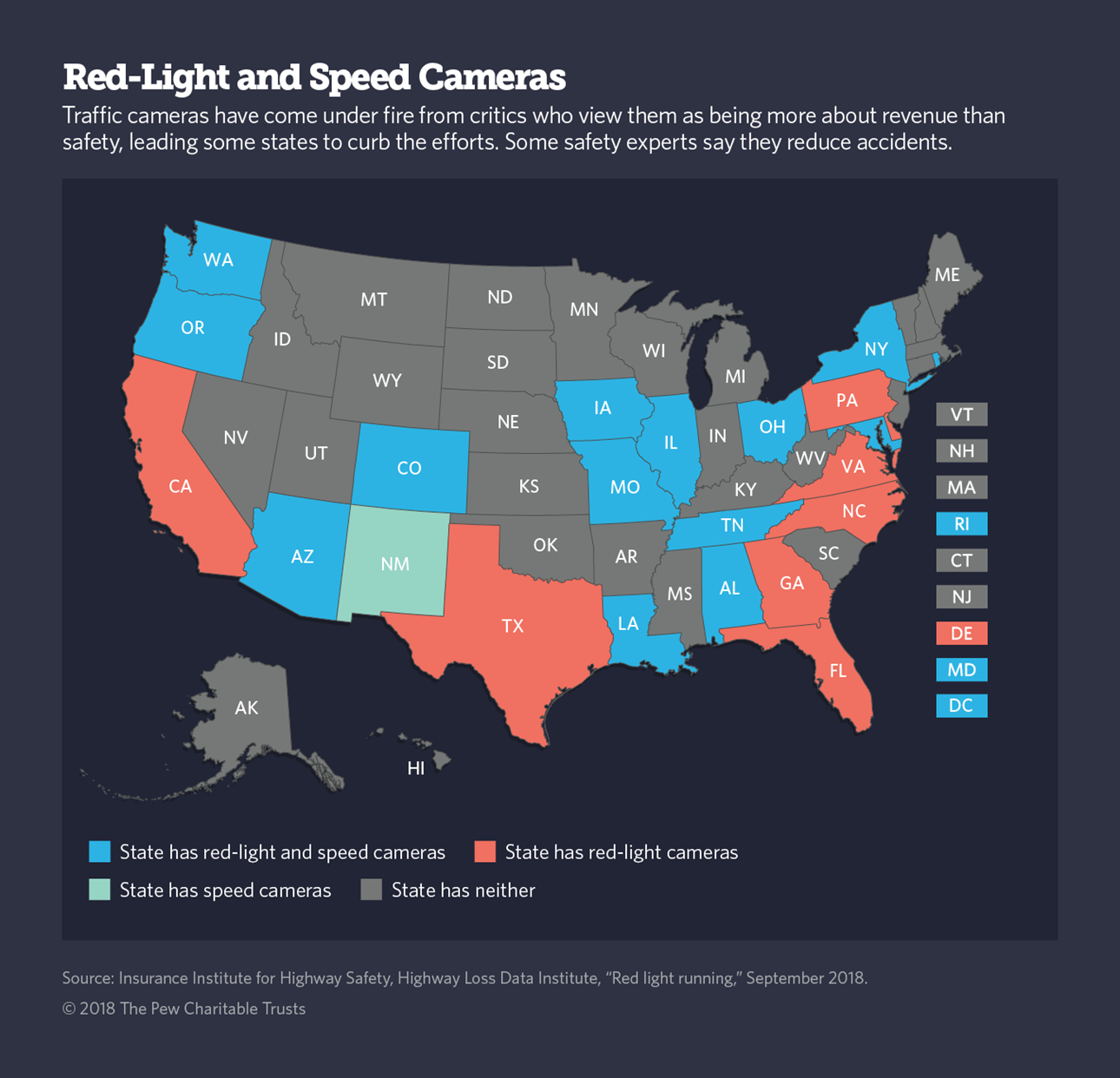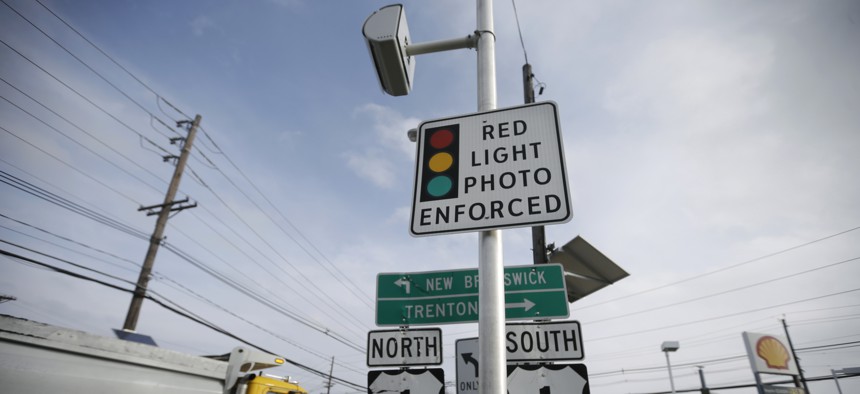Connecting state and local government leaders
States and local governments are turning against traffic cameras.
This article was originally published by Stateline, an initiative of The Pew Charitable Trusts, and was written by Elaine S. Povich.
Have you had it with red-light and speed cameras? You’re not alone; a growing number of states and cities are getting restless too.
Several states have moved to get rid of the cameras or squelch their use in local communities as complaints pour in from drivers who think the cameras are there to reap revenue rather than prevent accidents. The use of cameras has never survived a referendum, according to the National Motorists Association, a consumer group.
But the insurance industry has fought back, pitting its own studies against others about the cameras’ impact on traffic safety.
Some New Jersey lawmakers, though, are pushing legislation that would take the fight further than ever before.
The state ended its red-light camera program four years ago. Now, some Garden State lawmakers want to hamper other states’ red-light enforcement by prohibiting the state’s Motor Vehicle Commission from giving out identifying information on their residents to other states. That means if a New Jersey tag holder gets a ticket because of a speed or red-light camera in another state, New Jersey wouldn’t provide the name and address associated with the license plate.

Meanwhile in Ohio, a law was enacted last year that restricted cities’ ability to set up cameras at red lights. But the Ohio Supreme Court ruled in July 2017 that the law conflicted with cities’ home-rule authority that gives them jurisdiction over traffic enforcement. Even so, Columbus gave up on the cameras, refusing to re-install them because its residents were outraged.
And this year, Ohio lawmakers are back. The state House approved a bill in March that would require cities to adjudicate traffic cases in municipal court instead of using an administrative process and, in a dig at the safety vs. revenue argument, would cut funding to cities by the amount they get from camera tickets. The bill awaits action in the state Senate.
Other policymakers are considering changes too. In Iowa, the Senate passed a ban on traffic cameras, but the bill died in the House. In Arizona, the House voted to ban the cameras, and the bill is awaiting action in the Senate. Miami ended its red-light camera program in March, and voters have banned red-light cameras by referendum in at least seven Texas cities. Texas Gov. Greg Abbott, a Republican, in September called for an end to red-light cameras, even though they bring in about $16 million a year to local governments.
All indications are that the love affair with traffic cameras—especially at red lights—has peaked and is now in decline. Nationwide, 418 communities had red-light cameras and 146 communities had speed cameras as of September, according to the Insurance Institute for Highway Safety, an industry group that supports cameras. That’s down from a high of about 540 communities with red-light cameras in 2012. Speed cameras have remained steady, the institute said.
“I would say it’s peaked and it’s down by 20 percent or so,” said Paul Fisher, a University of Arizona researcher who studies traffic. “People seem to really not like red-light cameras. The referendums almost always lead to removal.”
Ballotpedia, a nonprofit that tracks ballot initiatives and referendums, shows the traffic-camera removal votes are usually approved.
Lawmakers are responding.
State Sen. Declan O’Scanlon, a New Jersey Republican, said that lawmakers in his state “heard from constituents all over the place” opposing the traffic cameras before scrapping the program. Now, he said he’s hearing from New Jersey tag holders who are getting tickets because of traffic cameras in other states, which led him to sponsor the bill.
O’Scanlon contends that communities deliberately set speed limits lower than the “sound engineering criteria” of a road would dictate, just so they can collect fines for speeding.
“If you are balancing your budget by randomly stealing from people behaving reasonably,” he said, “you should be ashamed of yourselves.”
The Ohio bill is aimed at threading the needle between revenue and safety, said Ohio Rep. Bill Seitz, a Republican and chief sponsor of the bill to cut funding to towns by the amount they collect in traffic-camera tickets and to hear the cases in municipal court, rather than have them adjudicated by a city employee administrator.
“The cities claim this isn’t about money, it’s about safety,” he said in an interview with Stateline. “I don’t believe that for a minute. But one way to prove it is to say, tell you what, for every dollar you collect from this, we will reduce state ‘local government fund’ money. We will still spend it on safety and improving state roads, but we will do the spending, not them.”
Seitz said his office gets “two or three calls a week … from folks who say ‘I got a ticket on I-75 in Dayton [or some other road]. This is obnoxious, do something about this.’ We are going to do it.”
Ohio legislative opponents argued it’s unfair to take a revenue stream away from local governments. And some cities that use the photo tickets note that state money for local governments has been reduced in recent years. They say they need the money.
In Iowa, Sioux City Mayor Bob Scott, an independent and a supporter of his city’s use of traffic cameras, said the devices have reduced speeding and red-light violations and garnered about $2 million a year that is spent on public safety. His major objection to the bill at the state level is that it undermines cities’ independence.
“For me, it’s a home-rule issue more than anything,” he said, adding that the “guys in Des Moines” continue to “take away our ability under home rule, and I’m not bashful about telling legislators about that.”
Safety Studies
Both sides cite studies to back up their positions.
Researchers Paul Fisher and Justin Gallagher showed in a 2017 study that red-light cameras changed the type of accidents at intersections, but found there was “no evidence of a reduction in total accidents or injuries.”
The researchers, who looked at intersections in Houston, found there was a reduction in “angle” accidents like side crashes and head-on crashes, but an increase in rear-end crashes, as drivers hit the brakes when the light turned yellow, as opposed to continuing through the intersection and risking a red-light ticket. And the number of injuries went up slightly, they said.
“A lot of these tickets are for violations that are one or two seconds too late, just after the light turns,” Fisher said. People think, “if I slammed on my brakes, I would get into an accident. So I go through and get a ticket,” he said, adding that “I guess that comes off as unfair to some people.”
The insurance industry group, the IIHS, cites its own research that found the opposite.
“A 2011 IIHS study of large cities with longstanding red light cameras found that cameras reduced the fatal red light running crash rate by 24 percent and the rate of all types of fatal crashes at signalized intersections by 17 percent,” it said in a report.
Chuck Farmer, the group’s vice president of research, said a study from Montgomery County, Maryland, found that when speed cameras were instituted “you immediately see a reduction in people speeding; 80 percent in the first few months. Over time, we see about an 8 percent reduction in crashes that are speed-related and a 19 percent reduction in serious and fatal crashes.”
O’Scanlon said the figures can be juggled to prove whatever point the group wants to make and that many studies are “deeply flawed.”
A study on Virginia’s cameras essentially took both sides. “The results of the comprehensive crash cost analysis varied based on the assumptions and jurisdictions used,” the study, from the Virginia Transportation Research Council, an arm of the state Department of Transportation, concluded.
Another study, this one from a group of researchers led by the University of South Florida, encouraged public officials to consider costs for accidents borne by drivers, not just insurance companies. This study, “Red Light Running Cameras,” included in a 2008 Florida Public Health Review, came out against cameras, and added: “Because the rigorous and robust studies conclude cameras are associated with increased crashes and costs, any economic analysis of cameras should include these newly generated costs to the public.”
Legal Issues
The debate over traffic cameras has repeatedly landed in court.
In Georgia, the libertarian Institute for Justice has sued Doraville over the town’s reliance on tickets and other citations to balance its budget. The group says up to 30 percent of the town’s expected revenue comes from fines and fees. It also pointed out that the adjudication board for camera citations is appointed by the city council.
That’s a conflict of interest, said Josh House, the group’s lead attorney in the case.
The city has moved to dismiss the case, which is still pending.
The issue of using fines and fees to bolster city budgets was highlighted after the demonstrations over a police shooting in Ferguson, Missouri, where a U.S. Department of Justice investigation showed the city’s collections for minor violations had increased 85 percent between 2010 and 2013 and disproportionately targeted African-Americans.
New Jersey’s O’Scanlon suggests that the people who are hurt most by the traffic-camera tickets are those least able to pay.
“I had a guy come up to me in New Jersey, he had tears in his eyes,” O’Scanlon said. “He had a wife and kids in a two-bedroom in Newark. The family got five tickets in the span of two weeks. They shared one car. It was the rent or the tickets. These are the people most victimized.”

NEXT STORY: Cats Are No Match for New York City’s Rats



